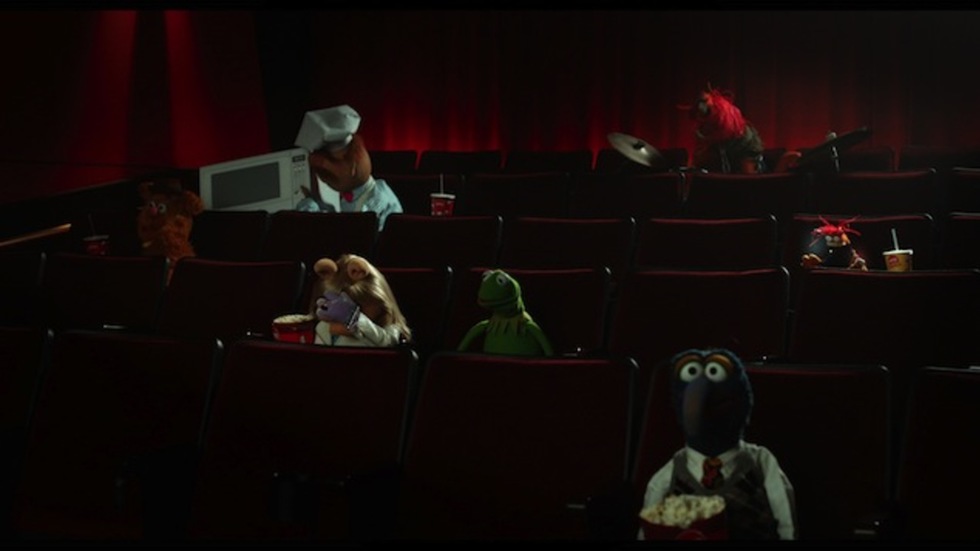
BY JOE REID |
Point/Counterpoint: Should Film Critics Use Their Phones in Screenings?
A call to 911 during the Toronto International Film Festival is once again raising questions about phone usage in theaters. We pulled in Latino Review's Dave Gonzales to hash out the issues of phones-at-the-movies once and for all.

The below series of Tweets came from FirstShowing.net's Alex Billington, whose attempts to see Ti West's The Sacrament at the 2013 Toronto International Film Festival were interrupted by cell phone usage among the other attendees at the Press & Industry screening. This dust-up — which included Billington calling 911 in order to find satisfaction — once again brought about a social-media discussion about cell phone usage in movie theaters. Particularly when it comes to critics' screenings, is it in any way defensible to be on your phone while the movie is screening?

I was sure about my stance on this issue, but after a short Twitter exchange, I asked Dave Gonzales of Latino Review to take part in a little point/counterpoint with me. We'll see if my righteous indignation could hold up against Dave's march-of-time modernism.
Joe Reid: Hey Dave! So once again we are to have a Serious Conversation About Cell Phone Usage In Movie Theaters. It's kind of the perfect flashpoint discussion, as it manages to involve film-critic process, Millennial-based generational strife, and complaining via social networks, three of the four essential elements of online debate (the fourth is "Batman castings"). Pivoting off of the specifics in the case of Billington's complaint and whether the Royal Canadian Mounted Police ever did take that theater by force, the issue here seems to be whether people should be using cell phones in Press & Industry screenings. My initial reaction was "NO! OBVIOUSLY! THEY SHOULD BE LOCKED UP!" And I guess I still hew closer to that line now even after having calmed down. Even more so than being annoyed by phones in public screenings, seeing someone on a phone in a press screening flips my lid because we're now beyond recreation.
Everybody's supposed to be doing their jobs. And not only does sending a text (or God forbid taking a call) in the middle of a screening bad form, it's now distracting me from doing my job, right? AND is it not also unfair to the filmmakers, who ought to have a reasonable expectation that the professionals evaluating their work are at least doing so via as unobstructed a viewing experience as possible? How much of an idealist does this make me?
Dave Gonzales: Billington was attending a Press and Industry screening at a film festival. TIFF itself does not allow cell phone use during their public/festival screenings, only during Press and Industry screenings. These are held in a separate theater and require different accreditation to get in, for free, to see both competition and out-of-competition movies. These are movies that are looking for distribution. Some films already have distro deals and some are likely to get a distro deal because of notable cast or creators. Other films are just there vying for a piece of the pie, if you will, and it's a piece of the pie that is increasingly diminishing as The Wrap Via The Chicago Tribune points out.
The "I(ndustry)" part of a "P(ress)&I(ndustry)" screening is a group of people with a completely different job than the person doing the complaining in this case. They are media buyers or someone's assistant who may not even want to be in that movie. The "P" is there to buzz a film they get to see before anyone else. Yes, there might be that occasional film you walk into that you weren't expecting to be worth a damn, but in a festival like Toronto where there are hundreds of films debuting, you're in a movie-grab-bag situation and the best thing to grasp at are movies that are going to get picked up and distributed so your "P" audience can give you all your "P" credit.
In this case, the complaining party is the one who seems incapable of doing his job. If someone covering TIFF for their website is capable of taking in 3-7 movies in a day and claiming they can still critically isolate each of those movies from each other and their own fatigue, then I have a hard time believing they can't suck it up with some light pollution in what is probably the SINGLE screening that movie gets allowing cell phone usage. It allows cell phone usage for the "I" audience, because those people are in a competitive business dealing with million dollar deals and more movies per day need to be processed on their end than on the "P" end.
Are you distracted by cell phone usage? Then I suggest you do your job even better and buy tickets for a public screening of the film in question, which will not allow cell phone use.
That's why Press and Industry screenings allow cell phone usage. Sundance does it too, but with a limited slate and such a long distance from awards season, it's not as super-competitive as the TIFF Industry Cell Phone Users Brigade is.
Problem #2 here is that Mr. Billington called an American Emergency Service to report Piracy rather than confronting the cell phone user, the theater manager, or festival staff. Granted, if this person was pirating a TIFF film — that's pretty bad. But what happened was he was using his cell phone (in a place where he was allowed to be using his cell phone) and Mr. Billington — CALLED 911 about a CRIME that WAS NOT being committed. This is the theater-going equivalent of thinking that killing an abortion doctor will stop women from getting abortions, not to mention it might actually BE ILLEGAL. I'm no lawyer, but I know a kid in my high school got publicly shamed by the community for abusing 911.
Now to your questions:
Everyone should be doing their job? Yes. But we're all doing it at the same time and with each other and (in the case of the "I" audience) in competition with each other. So be polite and know how to work the brightness control on your cell phone when you attend The Toronto International Film Festival Sponsored by Blackberry.
Are you distracted by cell phone usage? Then I suggest you do your job even better and buy tickets for a public screening of the film in question, which will not allow cell phone use.
Is it unfair to the filmmakers? In my opinion, no, it's part of the reality of the business. A P&I screening has certain rules at festivals and were not talking about a new festival here. This is TIFF, where Oscar Buzz Starts, so you get your movie into the festival, and you're playing the "P&I" game, not the audience game. Your audience award will come from audiences without cell phones. If the Press and Industry can't share a screening without screwing each other, monetarily, I'm guessing you'd take distribution and a larger overall audience than a screening that is inhospitable to media buyers and therefore limits the overall audience. That's a lot of assuming from me, but if they want to be a profitable filmmaker, they better get used to crazy shit like all your extras split over Wal Mart and Target special Blu-Rays. The system is going to grind up the weak and festivals is where it starts.
Hold on tight for awhile, soon we'll all be wearing Google Glass and the light pollution on those things won't be bothering anyone.
How much of an idealist are you? A big, huggable one. I'm not looking forward to a future where there's the Oculus Rift option in theaters because of so much cell phone usage, but the realities of capitalism combined with movie theaters insistence to make 4-quadrant blockbusters while TV niche markets itself only means that the theater is a communal experience, and like all communal experiences these days, will involve cell phones. But hold on tight for awhile, soon we'll all be wearing Google Glass and the light pollution on those things won't be bothering anyone.
Joe Reid: I get the letter-of-the-law thing when it comes to this particular TIFF case of rogue phones and abuse of emergency operators. I very much don't get the "you could just go to a public screening" thing, as A) deadlines and b) cell phone usage is monstrously more of a problem in public screenings, obviously, and somehow the fact that those are the screenings where cell phone use is "prohibited" doesn't actually deter anyone, no matter how much that nice Lorax in the pre-roll asks them not to. So brushing any and all complaining critics to these public screenings doesn't so much solve problems as it does brush the complainers aside so that Generation iPhone can clear the decks and be free to shine their giant phone faces in my eyes with impunity.
If we're still shushing fans at tennis matches, I have to believe there still exists a social contract that says certain public activities have agreed-upon restrictions.
Your argument on behalf of the "Industry" half of "Press and Industry" is pretty solid, of course. People gotta buy movies at festivals. And Lord knows what Google Glass will do to the game, true. And one day, my dream of head-phone jacks in public theaters will be a glorious reality. Until then, I'm not quite as willing to give up the ghost on giving the movies the fairest chance at an unencumbered viewing. If we're still shushing fans at tennis matches, I have to believe there still exists a social contract that says certain public activities have agreed-upon restrictions. But here I'm dipping into the "all phones everywhere" problem. I guess what I'm getting at is, is this just a "Get Over It/Get Used To It" thing?

Dave Gonzales: If the question is: should we have cell-phone usage in the theater, my personal answer would be that we shouldn't. However, I think a lot of things that don't come to pass because I'm part of a system within a system within a system. I'm preaching inevitability. I think it ends up being inevitable by default, because - I know it seems broad, but: Capitalism.
Take your argument A: deadlines. That's not an artistic motivation, that's a business motivation. That's about having your review up before sites that couldn't afford to pay someone to head up to TIFF. If you're the type of critic that moves consumers, like Ebert was, your fans will wait for your review and take it when it comes. If you're getting deadlined (WOW, I haven't used that word without making fun of Nikki Finke in about 2 years), that has nothing to do with art, that's your job and your job is to get it done, not to be distracted by flashing lights.
We're not, as much as we'd like it to be so, in an industry where art is rewarded and sadly we're at a time and place where within The Film Beltway (we don't have an actual beltway like DC, but I'm including festivals and events everyone covers from Sundance to the Oscars and back again) that it's a business, and that's what theater owners are up against. They need movies that run a certain amount of time to have the most showings and can reach the greatest amount of people, so you end up with stuff like an American cutdown of The Grandmaster. They need reasons to charge a whole bunch of money, so the hot dogs are 5x the price and movies in 3D (and cash-grab RPX) cost more. We're getting to the point where the status quo is that you pay for the particulars of your experience, not for permissions to alter a base experience. A normal $14.50 adult movie ticket only ensures the film will be projected on a wall around the time on the ticket, that's what it buys you and to expect more is unrealistic.
Being in a room full of people isn't - and philosophically cannot be - about providing the ideal experience for each person.
Onto argument B: the omnipresence of this so-called distraction!
Whenever I discuss this with people, the argument I'm trying to make isn't pro-cell-phone use, it's recognizing that being in a room full of people isn't - and philosophically cannot be - about providing the ideal experience for each person. Most of us grew up without cell phones in movie theaters, so we think that is the status quo. But, it's not. We also grew up before smoking wasn't allowed in theaters. Take the movie theater scene in Cape Fear: cigar smoke can really f*ck up your view of the screen. But, that used to be allowed and expected as part of what you were buying into going into a public space and that a lot of that period was before there was any other way to see a film.
I'd make the personal argument that living in this time period successfully is about one's ability to focus. Your twitter stream is crowded, you have calendar apps to keep things straight, phones are made so you don't have to memorize actual numbers anymore - HECK, if you have the patience and constitution for it, you don't need to have a cable subscription and can still watch everything. We're living in BIG DATA world and selective focus is a survival mechanism. So learn to focus. If not, live at press screenings and avoid the festivals or become a DVD/Blu-Ray critic and pump some money into your own dark room with a giant screen.
There are even specialty theaters like the Alamo Drafthouse that go Nazi on their own rules (something I think all theaters should do more of, regardless of what those rules are) and don't allow talking and cell phone use under penalty of being kicked out. They are making the experience what you're buying and catering to a certain sect of film goers. HOWEVER, I'd never see something like Transformers: Revenge of the Fallen or The Conjuring at a Drafthouse, I'd go see those in central Brooklyn, because I WANT to hear the "Bitch, don't go in there!" and the "MEGATRON JUST GOT F***ED UP!" comments. I want to hear the gasps and laughs, I want to see a movie with people. The energy I get out of a crowd exiting a film we all enjoyed - Attack The Block jumps to mind - is what I'm addicted to with theater going, not a pristine experience (take the Angelika on Houston Street - no cell phone usage, but it's over a subway station so you get audible rumbles every 10 minutes - still go there).
I've personally never been in a theater where a cell phone user has altered the experience in any way after being nicely and succinctly asked to either stop using their cell phone, exit the theater or turn down the brightness and use it on silent in between their legs, below the back of the seat. Yes, I've asked people to do that instead of just shushing them and they seem genuinely concerned that they'e been blasting their Galaxy Note in my face.
I guess if we're making cell phone usage "THE LINE" that cannot be crossed in the capitalist-driven evolution of movie theaters, I'm going to be making these arguments a lot. But the writing was on the wall for me when Alice In Wonderland pushed Avatar out of theaters and became a billion dollar movie on the backs of needless 3D technology that had no reason to be there outside a cash-grab for the movies and theaters. To me, we're re-arranging Titanic deck chairs to threaten any sort of action when theaters do other cash grabs that degrade the theater-going experience.
I can't make you feel good about it, Joe, but I hope you come around to it, because that's where we're going. : )

